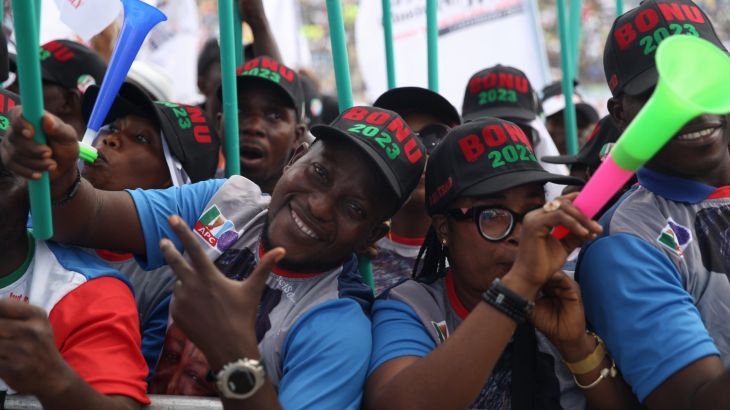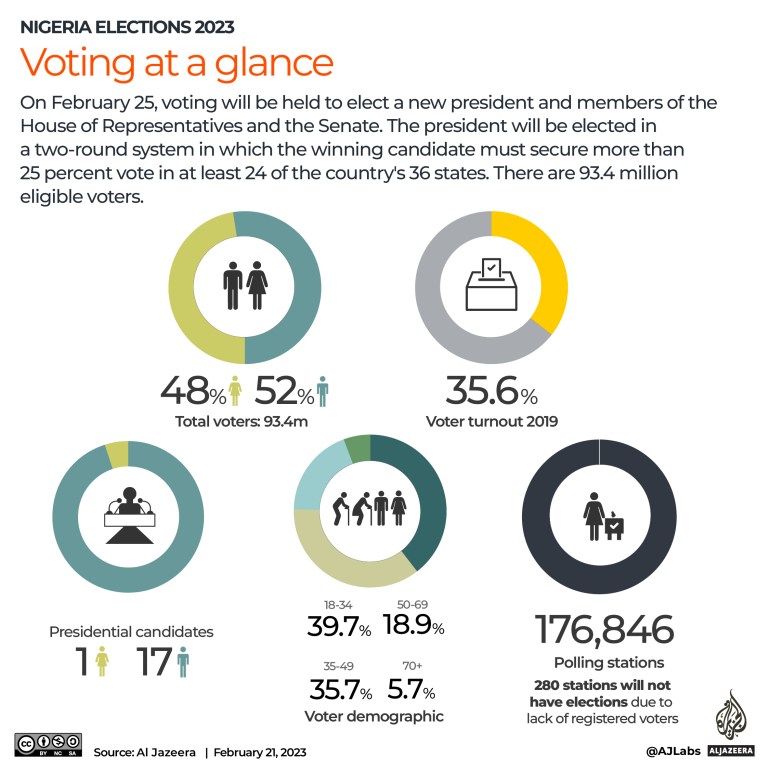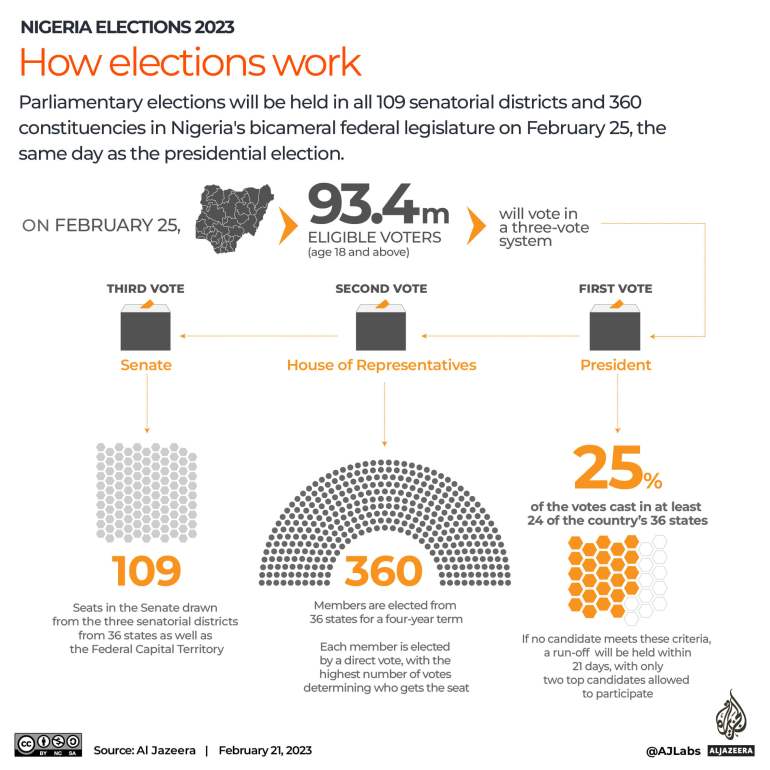Explainer: Key voting blocs ahead of Nigeria election
A close look at the four main voter constituencies and how they could affect Nigeria’s election results.

Voters are set to head to the polls on Saturday to elect President Muhammadu Buhari’s replacement as he serves out the second of his constitutionally permitted two four-year terms.
During their election campaigns, which officially ended on Thursday, candidates had to tailor their messages to appeal to individuals and the voting bloc they belong to. With voter interests varying according to age groups, religious beliefs, ethnicity, and the region they live in, this has been a challenging task.
Keep reading
list of 4 itemsThis is why you should care about Nigeria’s election
Nigeria Election: Will Anything Change?
Is a new Nigeria really ‘POssible’?
The leading candidates for president are former Lagos Governor Bola Tinubu, 70, who represents the ruling All Progressives Congress (APC), former Vice President Atiku Abubakar, 76, who represents the main opposition’s People’s Democratic Party (PDP), and Peter Obi, 61, an anti-establishment candidate popular among many young voters.
Here is a closer look at the four main voter blocs and how they could affect the upcoming election results:
The youth bloc
Politicians in Nigeria have historically ignored the youth vote, but that has changed. Of the 93.5 million Nigerians eligible to vote, 48 million are aged 18-34, according to the Independent National Electoral Commission (INEC).
And this number has been rising. A recent surge in political interest has the youth bloc now making up 76 percent of the 10 million newly registered voters. With a median age of 18, about 70 percent of the country’s population is below 30 years of age.
According to Mark Amaza, senior communications officer at Yiaga Africa, an Abuja-based nongovernmental organisation focusing on democratic governance, the 2020 #EndSARS protests were the major turning point for youth political participation.
Young people have become frustrated with the country’s free-falling economy and are motivated to fight high youth unemployment, poverty, and inflation, he said.
Within the youth bloc is a formidable student population who has their own reasons to vote.
Students have endured dilapidated learning facilities and have been shut out of school for 16 months because of a lecturers’ strike.
Forty percent of newly registered voters are students, according to the INEC, and the Nigerian University Commission has directed schools to announce a three-week school break so the country’s more than two million students can participate in the elections.
This youth bloc is also considered the primary muscle behind Peter Obi’s surprising popularity.
“The chances of an Obi win is directly linked to how these young voters turn out to vote and organise for him,” Amaza said.

The faith-based bloc
Nigeria’s population is nearly evenly split between its two main religions – Islam and Christianity – making each an essential part of the faith-based voting bloc.
This election cycle, other candidates might have an advantage following APC presidential candidate Bola Tinubu’s decision to pick another Muslim, Kashim Shettima, as his running mate. This has been seen as going against the political tradition to have contestants equally representing the country’s faith and geopolitical diversity.
Shettima’s appointment triggered protests from some Christian groups, who see it as a lack of commitment to religious representation.
Christian voters might also change their minds about the APC, which gained its support in 2015 and 2019 with Yemi Osinbajo, a pastor with the Redeemed Christian Church of God, as vice president.
There have been reports of increased attacks on Christians and clergies, even under a mixed-religion presidency, and some worry the situation might worsen under an all-Muslim presidency.
But Festus Keyamo, APC’s campaign spokesman, has sought to allay those fears.
“For anyone who wants to take care of the fear that the presidency will be unchecked during a Muslim-Muslim presidency, they should actually be looking at having, if at all it matters, having a Christian as a senate president or the chief justice of Nigeria because the government runs on a tripod. I am only appealing that all of the fears are unfounded,” Keyamo told local media.
Amaka Anku, professor at Georgetown’s Walsh School of Foreign Service and head of Eurasia Group’s Africa practice, said the Muslim-Muslim tickets might change the voting pattern of Christians in the Saturday polls.
Last year, at least 50 people died after gunmen attacked St Francis Xavier Catholic Church in Owo town, Ondo State, during church service. After the attack, a Christian Association of Nigeria spokesperson said violence against Christians “is becoming a hopeless situation”.
In Kaduna last June, gunmen stormed a church and abducted 36 people, killing three.
“It encourages a lot of Christians to vote for the only Christian on the ticket because they are upset and they don’t like that Atiku, also a Muslim, is on the other ticket,” Anku said.
The ethnic group bloc
The polls feature presidential candidates from the three major ethnic groups in Nigeria. With this, ethnic identity has become an added advantage in a race where electorates want the person occupying the country’s top office to be from their region.
According to Anku, this is historically the most reliable voting bloc because it is one of the ways people identify themselves in the country.
Voter turnout in the southeast, which has the lowest number of registered voters, dropped to 25 percent in the last election, but the presence of Obi, thought to have a real chance, might increase that number in the coming elections.
According to Amaza, the north has always looked after its own at the polls, which has served Buhari well, and Tinubu will be looking to inherit that voting bloc. However, Atiku, who is from the north, will also look to the votes from his region.
Party identity bloc
Experts point out many Nigerian voters identify with a party through association or the ones predominant in their region. But that may not stay true in this election as there is a wane in party affiliation.
According to Afrobarometer, an independent research group that measures public political perceptions, 39 percent of Nigerians do not feel an affiliation with established political parties. At 35 percent, the decline is more pronounced in the age group 18-35.
Governors are essential to presidential candidates when it comes to votes, according to Amaza, and the APC has the majority with 22.
“They are leaders of their parties in their states, and they also have access to money that can mobilise voters. But they can’t campaign for the opposition. They are also self-destructing because there is no way you will campaign against your party when you are also on the ballot. It just doesn’t make sense,” said Amaza.
He said this election would test the importance of ethnic and party identity, especially for Tinubu and Atiku.
But if Obi wins, it will signify neither of those blocs matters as much as they used to.
